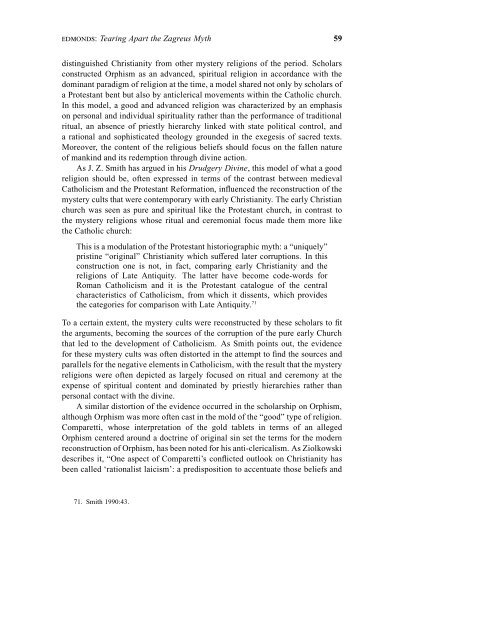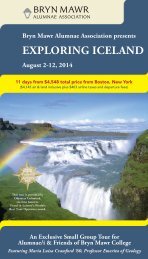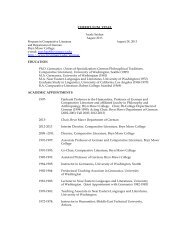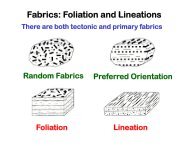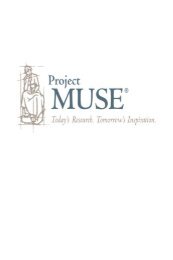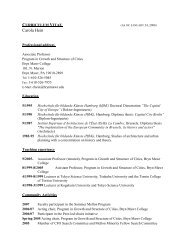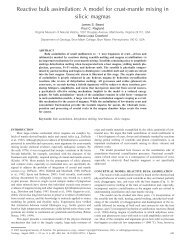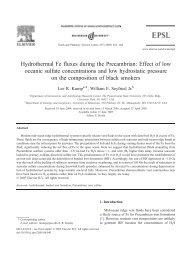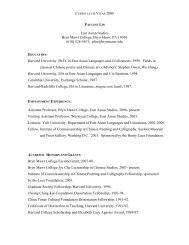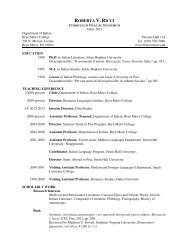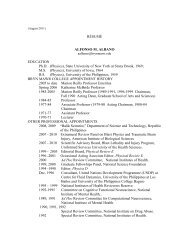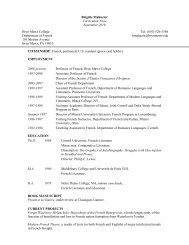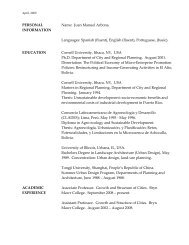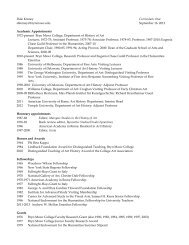Tearing Apart the Zagreus Myth - Bryn Mawr College
Tearing Apart the Zagreus Myth - Bryn Mawr College
Tearing Apart the Zagreus Myth - Bryn Mawr College
You also want an ePaper? Increase the reach of your titles
YUMPU automatically turns print PDFs into web optimized ePapers that Google loves.
EDMONDS: <strong>Tearing</strong> <strong>Apart</strong> <strong>the</strong> <strong>Zagreus</strong> <strong>Myth</strong> 59<br />
distinguished Christianity from o<strong>the</strong>r mystery religions of <strong>the</strong> period. Scholars<br />
constructed Orphism as an advanced, spiritual religion in accordance with <strong>the</strong><br />
dominant paradigm of religion at <strong>the</strong> time, a model shared not only by scholars of<br />
a Protestant bent but also by anticlerical movements within <strong>the</strong> Catholic church.<br />
In this model, a good and advanced religion was characterized by an emphasis<br />
on personal and individual spirituality ra<strong>the</strong>r than <strong>the</strong> performance of traditional<br />
ritual, an absence of priestly hierarchy linked with state political control, and<br />
a rational and sophisticated <strong>the</strong>ology grounded in <strong>the</strong> exegesis of sacred texts.<br />
Moreover, <strong>the</strong> content of <strong>the</strong> religious beliefs should focus on <strong>the</strong> fallen nature<br />
of mankind and its redemption through divine action.<br />
As J. Z. Smith has argued in his Drudgery Divine, this model of what a good<br />
religion should be, often expressed in terms of <strong>the</strong> contrast between medieval<br />
Catholicism and <strong>the</strong> Protestant Reformation, influenced <strong>the</strong> reconstruction of <strong>the</strong><br />
mystery cults that were contemporary with early Christianity. The early Christian<br />
church was seen as pure and spiritual like <strong>the</strong> Protestant church, in contrast to<br />
<strong>the</strong> mystery religions whose ritual and ceremonial focus made <strong>the</strong>m more like<br />
<strong>the</strong> Catholic church:<br />
This is a modulation of <strong>the</strong> Protestant historiographic myth: a “uniquely”<br />
pristine “original” Christianity which suffered later corruptions. In this<br />
construction one is not, in fact, comparing early Christianity and <strong>the</strong><br />
religions of Late Antiquity. The latter have become code-words for<br />
Roman Catholicism and it is <strong>the</strong> Protestant catalogue of <strong>the</strong> central<br />
characteristics of Catholicism, from which it dissents, which provides<br />
<strong>the</strong> categories for comparison with Late Antiquity. 71<br />
To a certain extent, <strong>the</strong> mystery cults were reconstructed by <strong>the</strong>se scholars to fit<br />
<strong>the</strong> arguments, becoming <strong>the</strong> sources of <strong>the</strong> corruption of <strong>the</strong> pure early Church<br />
that led to <strong>the</strong> development of Catholicism. As Smith points out, <strong>the</strong> evidence<br />
for <strong>the</strong>se mystery cults was often distorted in <strong>the</strong> attempt to find <strong>the</strong> sources and<br />
parallels for <strong>the</strong> negative elements in Catholicism, with <strong>the</strong> result that <strong>the</strong> mystery<br />
religions were often depicted as largely focused on ritual and ceremony at <strong>the</strong><br />
expense of spiritual content and dominated by priestly hierarchies ra<strong>the</strong>r than<br />
personal contact with <strong>the</strong> divine.<br />
A similar distortion of <strong>the</strong> evidence occurred in <strong>the</strong> scholarship on Orphism,<br />
although Orphism was more often cast in <strong>the</strong> mold of <strong>the</strong> “good” type of religion.<br />
Comparetti, whose interpretation of <strong>the</strong> gold tablets in terms of an alleged<br />
Orphism centered around a doctrine of original sin set <strong>the</strong> terms for <strong>the</strong> modern<br />
reconstruction of Orphism, has been noted for his anti-clericalism. As Ziolkowski<br />
describes it, “One aspect of Comparetti’s conflicted outlook on Christianity has<br />
been called ‘rationalist laicism’: a predisposition to accentuate those beliefs and<br />
71. Smith 1990:43.


